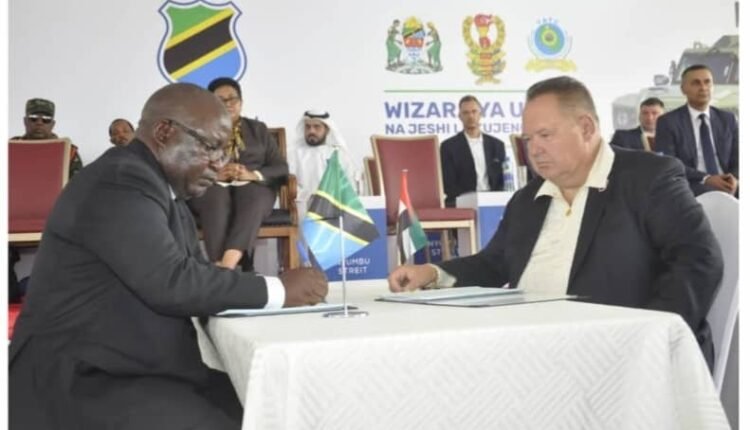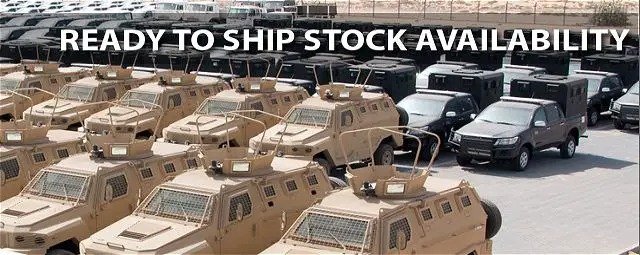Manufacturing UAE Armored Vehicles in East and Central Africa Spurs Controversy

Kibaha – Tanzania – Sudanhorizon
The Chairman of the Board of the Tanzania Automotive Technology Center, Lieutenant General Wayajonia Matthew Kisamba, and the CEO of the UAE company Astrit Group, Germán Guttroff, signed an agreement on Tuesday on manufacturing, repairing, and vending armored combat vehicles of Canadian origin in Tanzania.
The agreement was signed in the presence of Tanzanian Defense Minister Stergomena Lawrence Tax.
But the move sparked widespread controversy in East Africa, given the accusations leveled against the UAE and Canada by international organizations for allegedly contributing to the escalation of conflicts in various regions of Africa.
The official narrative:
In a press statement on Tuesday, the Tanzanian Defense Minister Stergomena Lawrence Tax, stated that the agreement, signed in the Kibaha suburb west of the commercial capital Dar es Salaam with the UAE company, “marks a new phase of military manufacturing in her country.” She said: “We will start with military vehicles, but the scope will expand to include other vehicles, and then exports to the East African market.” She urged Tanzanians to seize this opportunity.
In her statement, she added that discussions regarding the agreement began in 2022, involving experts from both sides, before culminating in the official signing. The Minister expected that the agreement would enhance local technological capabilities, create job opportunities for engineers and technicians, and position Tanzania as a hub for defense manufacturing in Africa.
For his part, the Chairman of the Board of the Automotive Technology Center in Tanzania, Lieutenant General (retired) Wajongia Matthew Kisamba, stated that the agreement is the first of its kind in Africa, and is a step that will enhance both industrial growth and national security. He added that the initiative will benefit Tanzanian youth in particular, especially graduates of technical institutes, and will provide them with direct access to advanced automotive technology, skills transfer, and employment opportunities.
Tanzanian Armed Forces Commander, General Jacob John Mkonda, said that the project is a strategic investment in national security and reflects Tanzania’s ambition to achieve self-reliance in military and technological matters. He noted that the Streit Group will transfer its expertise to local engineers, thus achieving long-term benefits for the country. Streit Group CEO, German Guturov, said that Tanzania was chosen for its economic, political, and geographical advantages, making it an ideal base for distributing armored vehicles throughout East and Central Africa. He pointed out that Streit Group is a leading global manufacturer of armored vehicles, a privately owned company with five state-of-the-art production facilities, producing a wide range of vehicles designed with meticulous attention to detail to provide complete and effective protection under all conditions. These include armored personnel carriers, luxury vehicles, custom-designed vehicles, and security vehicles.

One of the most dangerous agreements:
A military expert, speaking to the “SUDANHORIZON” news website, considered this agreement to be one of the most controversial agreements signed by the Republic of Tanzania. This is not because it concerns the defense industry, which is the right of any state, but because the Streit Group, founded in Canada in 1992 and one of the largest manufacturers of armored vehicles in the world, has faced accusations of serious violations of arms sales regulations for about ten years. The expert referred to a 2016 report by a UN panel of experts, which stated that the export of Streit vehicles to some countries experiencing armed conflicts constitutes a violation of the UN arms embargo. He also noted that the United States previously imposed a $3.5 million fine on two Streit Group subsidiaries, in addition to a $250,000 fine on Mr. Gutov himself, for selling US-made vehicles to Venezuela, Nigeria, Iraq, and Afghanistan without export licenses, after equipping them with ballistic steel and bulletproof glass.
The company’s vehicles in the hands of mercenaries:
According to The Globe and Mail newspaper, the Streit Group was founded and is headed by Canadian businessman German Gutov. Its vehicles have been spotted being used by mercenaries and armed groups in several countries experiencing armed conflicts. The introduction of these armored vehicles into the markets of East Africa, some parts of which are currently experiencing bloody conflicts, is likely to fuel violence and undermine peace in conflict zones, especially since the company has not adhered to international arms control regulations, particularly given its plans to build a similar factory to the one it operates in the United Arab Emirates.
The Sudanese War in the Tanzanian Press:
The Tanzanian newspaper, The Guardian, published a report Tuesday, regarding the UAE’s involvement in the Sudanese war. According to the newspaper, Sudan has filed formal complaints with the UN Security Council, accusing the UAE of recruiting, financing, and deploying mercenaries. The allegations include the Rapid Support Forces (RSF) using UAE-made armored vehicles, such as the Nimr Ajban armored personnel carriers, equipped with French Galix systems. Another important report stated that “armored vehicles from a Canadian company are in the arsenal of a Sudanese paramilitary force accused of committing genocide, according to new photos and videos from the war-torn country.” The newspaper adds: “The photos show the armored vehicles in war zones in Sudan, including in Darfur, where they were transporting RSF fighters, a militia that has committed widespread massacres and atrocities in Darfur and other parts of Sudan.” According to The Guardian, independent weapons experts identified the vehicles as manufactured by Streit Group. The report cited a story in The Globe and Mail, which confirmed that Streit had sold dozens of armored vehicles to Libya, Sudan, and South Sudan, despite the international arms embargo against those countries.
Fear about prolonging conflicts:
Despite international efforts to resolve conflicts in Africa and “silence the guns,” observers of the activities of armed groups have expressed concerns about Tanzania’s decision to host a factory for the Emirati company, which disregards international norms and laws and operates in the weapons industry. This could potentially escalate violence and conflict in conflict-prone regions of southern and eastern Africa. Furthermore, the company, located in this region, will undoubtedly benefit from its proximity to areas rich in strategic minerals, many of which are controlled by rebel and armed groups such as the March 23 Movement in the Democratic Republic of Congo, Al-Shabaab in Mozambique and Somalia, and militias in South Sudan, thus potentially prolonging the conflict by continuing to supply these groups with weapons.
Shortlink: https://sudanhorizon.com/?p=7871

